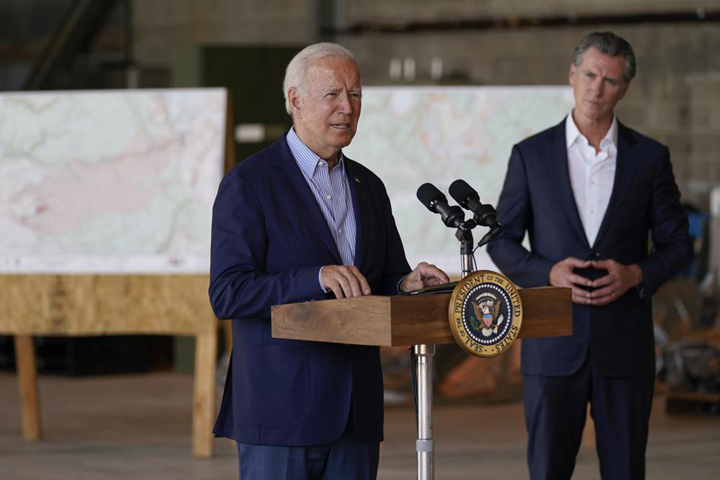
As President Joe Biden visited one disaster site after another this summer—from California wildfires to hurricane-induced flooding in Louisiana and New York—he said climate change is “everybody’s crisis” and America must get serious about the “code red” danger posed by global warming.
In many ways, the president is making up for lost time.
Biden and Democrats are pursuing a sweeping $3.5-trillion federal overhaul that includes landmark measures to address climate change and reduce greenhouse gas emissions in what would be the most consequential environmental policies ever enacted, after years of fits and starts.
Sidelined after the former administration withdrew from the landmark Paris climate accord—the 2015 global effort to confront climate change—the US has returned to the arena, with Biden promising world leaders in April that the US would cut carbon pollution in half by 2030.
But following through on Biden’s climate goals depends in large part on passage of the Democratic package, and it will take the White House’s heft to close the deal between centrist and progressive lawmakers, including disputes over its climate provisions. A poll last month by The Associated Press-NORC Center for Public Affairs Research shows 83 percent of Democrats are very concerned about climate change, compared with just 21 percent of Republicans.
Included in the massive legislation is a nationwide clean-electricity program that is intended to eliminate climate-damaging fossil fuel emissions from US power plants by 2035—catching up to requirements already set in some states. The proposal would spend billions to install 500,000 electric vehicle charging stations and upgrade the power grid to make it more resilient during hurricanes and other extreme weather events that are increasing and intensifying as a result of climate change.
The measure also would create a New Deal-style Civilian Climate Corps to unleash an army of young people to work in public lands and restoration projects.
“The climate crisis is here, and the cost of inaction is already staggering,” said Energy and Commerce Chair Frank Pallone, D-N.J. The US had 22 climate and weather disasters in 2020 with losses exceeding $1 billion each. Hurricane Ida and other recent disasters are likely to cost tens of billions more.
Overall, the Biden package aims to provide more than $600 billion to tackle climate change and lower greenhouse gas emissions, funded in large part by taxes on corporations, the wealthy and other fees, keeping to Biden’s pledge not to raise taxes on anyone earning less than $400,000 a year. One alternative for raising revenues would be to impose a carbon tax. Oregon Sen. Ron Wyden, chairman of the Senate Finance Committee, said Monday he is developing legislation “that would make polluters pay for the costs of the climate crisis.”
But Wyden and others are mindful of Biden’s pledge not to hit pocketbooks of Americans and the senator said the carbon tax is being developed as part of a menu of options for consideration.
With elections around the corner, approval of the bill is crucial, Democrats say.
“If we miss this moment,” said Sen. Sheldon Whitehouse, D-R.I., referring to Democratic control of Congress and the White House, “it is not clear when we will have a second chance.” AP
Image courtesy of AP

